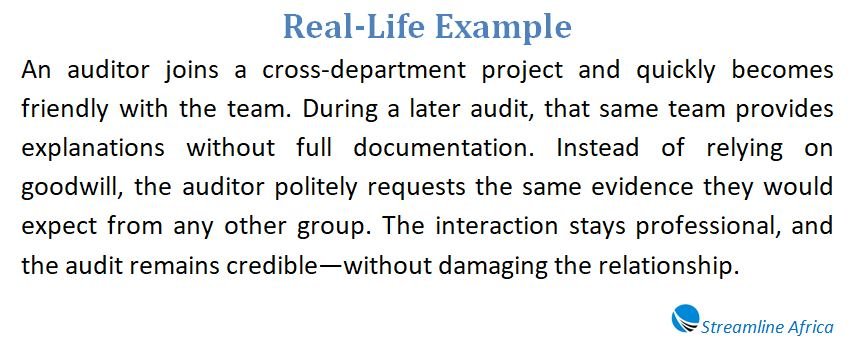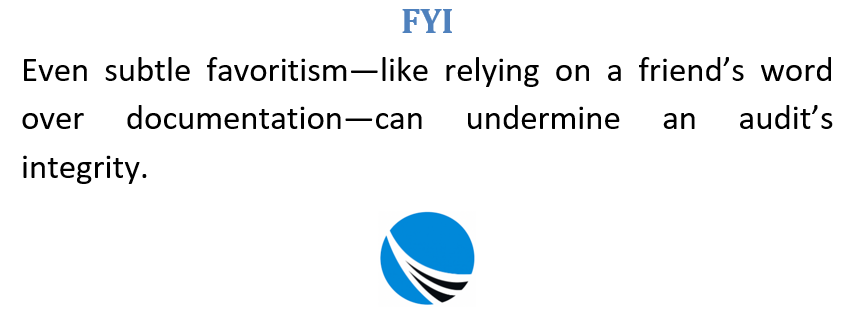The workplace is often more than just a space where tasks are performed and goals are met—it becomes a social landscape filled with camaraderie, friction, and everything in between. Auditors, in particular, find themselves in a unique position where their role can amplify both the ease and tension of these interactions. Because they’re charged with evaluating others’ work, auditors can form bonds or rivalries that may influence the perception—and reality—of their objectivity. Managing these dynamics carefully is essential.

The Fine Line Between Camaraderie and Conflict
Most of us, at some point, have formed friendships at work that felt effortless and natural. Shared experiences, mutual goals, and long hours make it easy to connect with colleagues. These connections can make a tough job more enjoyable and often improve teamwork and morale. However, for auditors, these relationships come with additional complications.
Unlike many roles, auditors must remain impartial at all times. Their findings and recommendations influence decisions that may affect people’s reputations, responsibilities, or even job security. When close personal bonds exist, this impartiality can be tested. On the flip side, unresolved conflicts or dislike for a colleague can be just as dangerous. Either extreme may distort professional judgment and introduce bias into the audit process.
Work Friendships: Joyful, Yet Tricky Terrain
Having a close ally at work can make your day brighter and more fulfilling. Sharing meals, venting about challenges, or discussing family life can offer a much-needed emotional outlet. These friendships often lead to better communication and trust, which, on the surface, may seem like an asset for auditors.
Yet, the perception of partiality is an ever-present risk. A work friend might receive more lenient treatment, or worse, others might believe they do. When auditors begin to rely more on verbal confirmations from friends than documented evidence, or when they delay scrutiny to preserve a relationship, objectivity is compromised.
The real concern isn’t only about actual bias—it’s about perceived bias. Even if your actions are defensible, others might view them with skepticism if they involve a close friend. This undermines not just your work, but the credibility of the audit function as a whole.

A Friendly Face, a Firm Line
During a routine internal audit, an auditor is assigned to review expense reports from a department they know well. One of the submissions belongs to a colleague they regularly have lunch with—someone they trust and genuinely like. While scanning the documents, the auditor notices a small but clear policy breach. It would be easy to overlook it and have a quiet word later. Instead, they document the issue just as they would for anyone else, recommend a correction, and move on.
The colleague isn’t thrilled at first, but the consistency sends a clear message: the audit process isn’t personal. Over time, that fairness strengthens trust—not just between the two of them, but across the wider team.

Defining and Demonstrating Independence
Auditor independence exists on two levels: mental objectivity and external perception. While you may feel that your thought process is clean and fair, if your actions suggest favoritism—or enmity—others may see a conflict of interest. It’s this dual nature that makes independence a cornerstone of the auditing profession.
To maintain it, auditors must make consistent decisions based on evidence, not emotion. Treat your closest ally the same way you would approach someone you hardly know. Ask the same questions. Seek the same documentation. Apply the same scrutiny.
What Happens When Trust Is Tested?
Imagine you deeply trust a colleague—someone who embodies integrity in every sense. You’ve always considered them honest and principled. Then one day, you discover something shocking: evidence of wrongdoing, perhaps even fraud.
This scenario tests not only your ethics but your sense of judgment. While confronting such a truth is painful, the responsibility of an auditor is to report facts, not to protect people. No friendship, however cherished, should override professional duty. True independence lies in the willingness to act in the best interest of the organization, regardless of personal consequences.
When Personal Bonds Collide with Confidentiality
Auditors often have access to sensitive information, and sometimes this includes details that may impact someone close to them. Layoffs, performance issues, or departmental changes can create conflicts between discretion and empathy. In such moments, it’s tempting to offer a heads-up or express sympathy—but even small breaches of confidentiality can have serious implications.
An auditor’s obligation is not to share, hint, or suggest but to safeguard information until it is officially communicated. Remaining silent in such scenarios isn’t cold-hearted—it’s professional.
Minor Mistakes and the Pressure to Protect
Not all issues are dramatic. Occasionally, you’ll notice a small error—a friend who miscalculated a figure or skipped a control. It’s easy to justify brushing it off or giving a verbal reminder instead of formally documenting it. But when auditors make exceptions, they set dangerous precedents.
If a peer made that mistake, you’d report it or suggest corrective action. That standard should apply across the board. The role of an auditor requires consistency. Letting something slide today could undermine your authority tomorrow.
Avoiding Friendships If You Can’t Stay Neutral
While many auditors manage to juggle friendships and their responsibilities, not everyone can do so objectively. If you know that emotional attachments affect your work—if you’re tempted to protect friends or punish foes—then it may be wise to limit how close you get. Emotional boundaries are just as critical as professional ones in maintaining impartiality.
The Subtle Risks of Dislike
Friendship isn’t the only threat to independence. Dislike can be equally problematic. Perhaps someone rubs you the wrong way, resists collaboration, or dismisses your role. It’s natural to feel tension. However, allowing that negativity to influence your audit planning or reporting is just as dangerous as favoritism.
One scenario that occurs too often is the targeting of disliked departments or individuals. Bias can show up in how interviews are conducted, which processes are scrutinized, or how harshly findings are worded. None of this helps build trust in the audit process. It erodes credibility and fosters resentment.
Toxic Team Dynamics and Institutional Enablers
At times, organizational culture itself exacerbates personal conflicts. Leaders might enable departmental rivalries or allow their own grudges to trickle down to their teams. This creates environments where auditors are directed to approach some groups with suspicion and others with leniency.
In such environments, auditors may face pressure to apply different standards. This goes against the very principles of the profession. Maintaining integrity under pressure is difficult, but essential. Auditors must advocate for fairness—even if it means challenging their own leaders.
A Lesson from the Stage
Actors often portray both heroes and villains with equal empathy, striving to understand motivations rather than passing judgment. Auditors can adopt a similar mindset. Rather than labeling people as “good” or “bad,” focus on understanding processes, causes, and consequences. When an error is found, ask why it happened—not who is to blame.
Understanding the broader context doesn’t excuse misconduct, but it ensures that your conclusions are rooted in facts, not emotions. Whether someone is your closest colleague or a challenging counterpart, the goal remains the same: reveal the truth.
The Silent Strain of Indifference
Sometimes, the biggest challenge isn’t affection or animosity—it’s indifference. A colleague might ignore your emails, skip scheduled interviews, or resist engagement entirely. In turn, you might start excluding them from the process just to avoid the hassle.
This creates an imbalance. Other team members may end up over-involved, and your findings become less representative. Even if someone is uncooperative, they must be given equal opportunity to contribute or clarify. Your role gives you the authority to insist on participation. Use it, respectfully and consistently.
Moving Forward with Awareness
Mistakes happen. We’ve all let our feelings cloud our judgment at some point. What matters is our willingness to recognize this and improve. Auditors should regularly reflect on their relationships and the subtle ways they may influence behavior. A moment of self-awareness can prevent months of compromised integrity.
Final Thoughts
Auditing requires more than technical knowledge. It calls for emotional intelligence, restraint, and ethical courage. Every relationship—whether friendly, neutral, or strained—has the potential to affect how we work. The goal is not to avoid all connection, but to ensure that our professional responsibilities always come first.
When handled with honesty and care, even difficult relationships can be navigated successfully. In the end, what matters most is that the truth is upheld, consistently and impartially.

Very Important Questions and Answers
How can workplace friendships affect an auditor’s objectivity?
Workplace friendships can lead to perceived or actual bias, especially if auditors treat friends more leniently or rely on trust over evidence. This can compromise both independence and the credibility of the audit.
Why is perceived independence as important as actual independence?
Even if an auditor remains fair, others may question their objectivity if they appear too close or too hostile to auditees. Maintaining both real and perceived neutrality is essential to uphold trust.
What should auditors do when they uncover mistakes made by friends?
Auditors must handle such findings just as they would with anyone else—objectively, professionally, and in line with audit standards. Personal ties should not alter the response or documentation.
How should auditors manage workplace conflicts or dislikes?
Auditors must not allow personal tensions to influence their audit planning, scrutiny, or reporting. Every auditee deserves equal treatment, regardless of interpersonal dynamics.
Is it okay for auditors to avoid uncooperative or unfriendly colleagues?
No. Avoidance can lead to skewed audit results and unfair burdens on others. Auditors must engage all relevant personnel to ensure thorough and balanced findings.
How can auditors maintain confidentiality when friends are affected by audits?
By prioritizing professionalism and company loyalty, auditors must withhold sensitive information—even when it’s tempting to alert or support a friend privately.
What’s the biggest risk in having a “work bestie” as an auditor?
The main risk is the perception or reality of favoritism, which can damage audit integrity and organizational trust if not managed with clear boundaries.
Can emotional distance be necessary in auditing roles?
Yes. When personal feelings interfere with impartiality, auditors should consider limiting close bonds or emotional involvement in order to maintain ethical standards.

